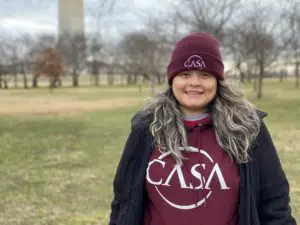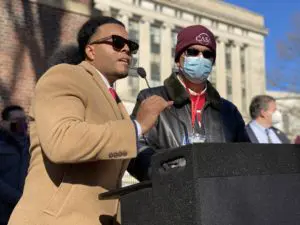Woodbridge Revitalization
History of CASA
in Virginia
In 2013, responding to requests from the Latino and immigrant communities for more support in northern Virginia, CASA opened its first office in Arlington. In 2016, we began providing worker and social services where there were high concentrations of immigrants (22.8% of Prince William County residents are immigrants, which is significantly higher than the national average of 13.7%) and very few organizations with the cultural and organizational capacity to support them. We conducted daily outreach, connecting workers and community members to services including free health care coverage, providing ESOL classes, and educating workers about their rights in the workplace. CASA now serves Falls Church, Arlington, Culmore, Woodbridge and other areas of Fairfax and Prince Williams Counties, as well as parts of Stafford County.
Over the past six years, CASA has built a reputation as an effective leader in Virginia for social justice campaigns statewide, challenging the systems that keep our members in poverty through policy advocacy, alliance building, grassroots organizing, and authentic, community-based leadership development. Working with our members and allies, we identify targets that are top priorities for immigrant and working-class families. CASA also annually provides 10,000 Virginia residents with services to meet their immediate needs. Our high-quality services cover a wide range, from job placement to social services support and referral, citizenship, ESOL, financial literacy, youth afterschool programming, leadership development, and advocacy training.
CASA’s mission in Virginia is to be an effective agent of change for communities of color and working-class families. We will achieve this through effective implementation of the three main pillars of our work: services, organizing, and advocacy. Our Welcome Centers serve as the hubs to our community, providing a safe space for our members and the community to gather, organize and access work and resources.
The Case for Woodbridge
CASA’s mission in Virginia is to be an effective agent of change for communities of color and working-class families. To achieve this mission, CASA needs a base of operations that will support an expansion of staff and services, provide a central organizing location for CASA members and community leaders, and demonstrate its long-term dedication to advancing social justice for workers and low-income immigrants in the Commonwealth.
Once renovated, CASA’s new Woodbridge site will serve as that base of operations.
Our Welcome Centers serve as the hubs of our community, providing a safe space for our members and the community to gather, organize and access work and resources. CASA’s previous office in Woodbridge was inadequate to support the full range of services, advocacy, and organizing CASA provides to the expanding low-income immigrant and working-class communities in northern Virginia and elsewhere in the Commonwealth. And with increasing demand for social services referrals and support, rising interest in CASA’s job placement and workforce development programs, the need for legal services, and plans to develop a vocational training space, CASA’s newest Woodbridge office can accommodate CASA’s plans for growth.


What We Will Accomplish
Through this project, CASA will establish a permanent CASA Center at 2359 Research Ct, in Woodbridge, Prince Williams County. In addition to allowing CASA in VA to significantly expand the number of individuals who receive current services, the new location will allow CASA to add the following:
- Expanded space for year-round youth leadership and workforce development programs.
- Expanded workforce development programs to include accredited vocational training in hands-on labs in partnership with labor unions, the local Community College, and other organizations.
- Wrap-around financial and support services for new arrivals and other low-income families, including tax preparation, citizenship assistance, computer literacy, and civic engagement.
- Legal representation and weekly legal clinics.
- Capacity for leadership development for Latino, minority, and immigrant youth. This will include workforce and college readiness, academic support, and community service.
- Expanded staff, more classroom space, and more room for training and convening community leaders, activists, partners, and allies.
CASA's Program Expansion
When renovations are completed, CASA’s Woodbridge office will allow CASA to greatly expand the services we provide to immigrant and working-class communities. In particular, this new space will allow CASA to expand our workforce development and youth education programs.
While the above services and programs are either yet to begin or still in their early stages in Virginia, each is supported by years of experience, innovation, and success in CASA’s legacy communities in Maryland. CASA brings a proven, data-driven approach to program design and leverages topic area experts, cutting-edge best practices, and a collaborative, member-first model that makes our programs highly effective while still adaptable to local contexts and responsive to community needs.
Workforce Development Programming – In light of the COVID-19 pandemic, CASA’s workforce development is now more necessary than ever. Our programming addresses the unique needs of underemployed and hard-to-employ residents in low-income neighborhoods.
CASA bases its workforce programming on ongoing research and analysis of socioeconomic conditions and ongoing input from community members. CASA’sWorkforce Development program takes into account such analysis and includes five main components:
- Recruitment and Intake: CASA recruits participants through targeted outreach (door-to-door and through referral partners and client networks) in neighborhoods with high underemployment rates among Latino and African American adults. Participants complete an initial intake interview (pre test) to identify personal economic goals and needs.
- Life Skills and Economic Success Training: CASA provides financial literacy training on topics such as an introduction to the formal banking sector, how to create and maintain a household budget, and how to save for the future. Legal workshops on rights and responsibilities in the workplace, as well as workshops on expungement, will also be offered.
Job Readiness and Retention (Soft Skills) Training: CASA provides workers with the skills needed to obtain a job and the skills needed to retain a job such as: resume and interview guidance, professional expectations, information on the U.S. employment system and overview of general customer service.
- Vocational (Hard Skills) Training: CASA’s vocational training focuses on training for jobs with “best prospects” – industries where demand is currently high and there is a projection of growth. The jobs also provide family-sustaining wages and have career ladders to potential upward mobility. The core industries on which CASA is currently focusing most of its efforts are in construction and health care, both sectors that provide “best prospect jobs.”
Individual Wraparound Services: Training is complemented by critical wraparound services including financial counseling, tax preparation assistance, legal counseling/expungement assistance, ESOL classes, resume writing assistance, job placement assistance, and referrals to GED programs, and health and mental health services as appropriate.
Youth Education Programming – CASA’s Mi Espacio program – targets at-risk Latino students and combines academic support with life skills including workforce development, financial literacy, health education, and civic leadership development. A primary goal of the program is to ensure that at-risk Latino high school students have the academic and social support they need to graduate from high school and that when they graduate they have developed a personal development plan that may include going to college, opening a business, or entering the workforce.
